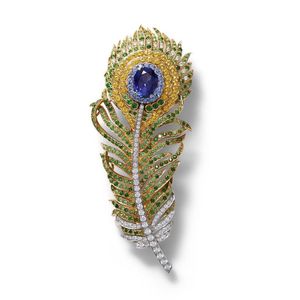Tiffany & Co. Peacock Feather Gem Brooch, Circa 2008
Tiffany & Co. gem-set and diamond feather brooch, circa 2008, modelled as a peacock feather, the eye claw-set with an oval tanzanite, framed by a triple tier of circular-cut sapphire, yellow sapphire and Tsavorite garnets, the barbs embellished with brilliant-cut diamonds and tsavorite garnets, the shaft pave-set with brilliant-cut diamonds, the diamonds together weighing approximately 1.75 carats, mounted in platinum and 18ct gold, length 3.90 in., width 1.38 in., trombone clip fitting, scratch numbered 2xxxxxx8, signed France, Tiffany & Co., accompanied by a Tiffany & Co. Box., notes, the peacock feather is a symbol of beauty, luxury, and power. This peacock feather brooch is a contemporary reimagination of an iconic 1897 design by Louis Comfort Tiffany for Mrs Alva Smith Vanderbilt., Tiffany & Co.'s modern interpretation of the peacock feather brooch is a testament to the house's skill in design and craftsmanship, a beautiful and unique piece of jewellery that turns heads and represents a triumph of modern design., Literature, Legendary Tiffany, Tiffany and Company, pp. 30.
You must be a subscriber, and be logged in to view price and dealer details.
Register Now to view actual auction price for this item.
- Tsavorite - Tsavorite is a green coloured garnet, first discovered by a British geologist, Dr Campbell R. Bridges in 1961 in Zimbabwe while working for the United Kingdom Atomic Energy Authority.
Unable to obtain a mining permit, he began prospecting in Tanzania and in 1967 made a second discovery of Tsavorite in northern Tanzania in 1967. Dr Bridges commenced mining the deposit, but the mine was nationalised by the government, so Dr Bridges moved to Kenya, where he made a third discovery of the mineral at the end of 1970.
Tiffany & Co. began promoting the then unnamed mineral in 1973 in association with Dr. Campbell, and it was agreed it should be named Tsavorite, after the Tsavo National Park in Kenya, near to where it was mined.
Dr Bridges died aged 71 in 2009 on his property in Tsavo National Park, Kenya, when he and his son were attacked by a mob in a dispute over mining rights. - Circa - A Latin term meaning 'about', often used in the antique trade to give an approximate date for the piece, usually considered to be five years on either side of the circa year. Thus, circa 1900 means the piece was made about 1900, probably between 1895 and 1905. The expression is sometimes abbreviated to c.1900.
- Tier - One or more under-shelves of a table or cabinet.
- Claw Set Jewellery - The description "claw set" in jewellery refers to a setting where the gemstone is held in place by metal prongs that resemble claws. These prongs are bent over the edges of the gemstone to secure it in the setting. This type of setting is commonly used for diamonds and other precious stones.
This item has been included into following indexes:
